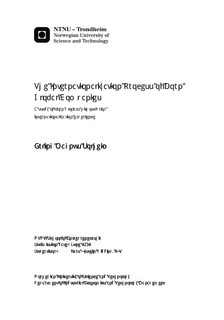The Internationalization Process of Born Global Companies: A study of born globals without prior internationalization experience
Master thesis
Permanent lenke
http://hdl.handle.net/11250/266344Utgivelsesdato
2012Metadata
Vis full innførselSamlinger
Sammendrag
Background: Observations of born global firms breaking with the traditional paradigm of stage-wise internationalization processes led to the emergence of the field of International Entrepreneurship (IE), an intersection between International Business and entrepreneurship. Literature calls for stronger theoretical foundation in IE research and increased use of theory from the field of entrepreneurship. A recent research stream employs effectuation theory from the entrepreneurship domain in modeling the internationalization process, though in various ways. There is also a consensus that experience is necessary to found born global companies and to do it using effectual logic. Purpose: The purpose of this thesis is to increase the understanding of the internationalization process and the role of experience in born global firms. It aims to contribute to the recent stream of research employing effectuation theory on internationalization processes. For practitioners, it aims to increase the knowledge of effectuation as viable internationalization logic and the role of experience to born globals. Method: An empirical case study has been conducted using two case companies which recently have gone through an internationalization process, both without prior internationalization experience. Transcribed and coded interviews with founders from both firms were analyzed using a theoretical framework developed from a literature review. Results: The results show that both case companies, despite lack of prior internationalization experience, comply with the definitions of being born globals and their internationalization processes seem to follow an effectual logic. Both firms show tendencies to rely on key resources within their network for knowledge and confidence. Theoretical Implications: This thesis firstly shows that prior internationalization experience is not necessarily required for founding born globals using effectual logic. Effectuation is also shown to be a viable theoretical framework for understanding the early internationalization process of born global firms, also those without prior internationalization experience. This thesis suggests that a possible substitute for experience among inexperienced born globals is knowledgeable key resources within their network. Practical Implications: Entrepreneurs and stakeholders of born global firms in an early internationalization process are recommended to acknowledge the likely effectual character of the process, for example by focusing on exploiting contingent opportunities rather than making detailed plans of the process ahead. It is also recommended to be attentive to the importance of key knowledge resources in the network for firms without prior internationalization experience. Originality / value: Few studies have employed effectuation theory to understand the early stages of the internationalization process of born global firms, and especially on firms without prior internationalization experience. This thesis increases the generalizability of effectuation as theoretical framework to understand internationalization, and develops the understanding of experience’s role in born global firms. Limitations and future research: The thesis had a limited time frame, and future research is recommended to incorporate a temporal perspective through for example longitudinal studies of born global firms from inception toward successful internationalization. By including firms with and without prior internationalization experience in the sample, knowledge could also be gained as to how this influences their behavior and potential success. Keywords: International Entrepreneurship, Born Globals, Effectuation
